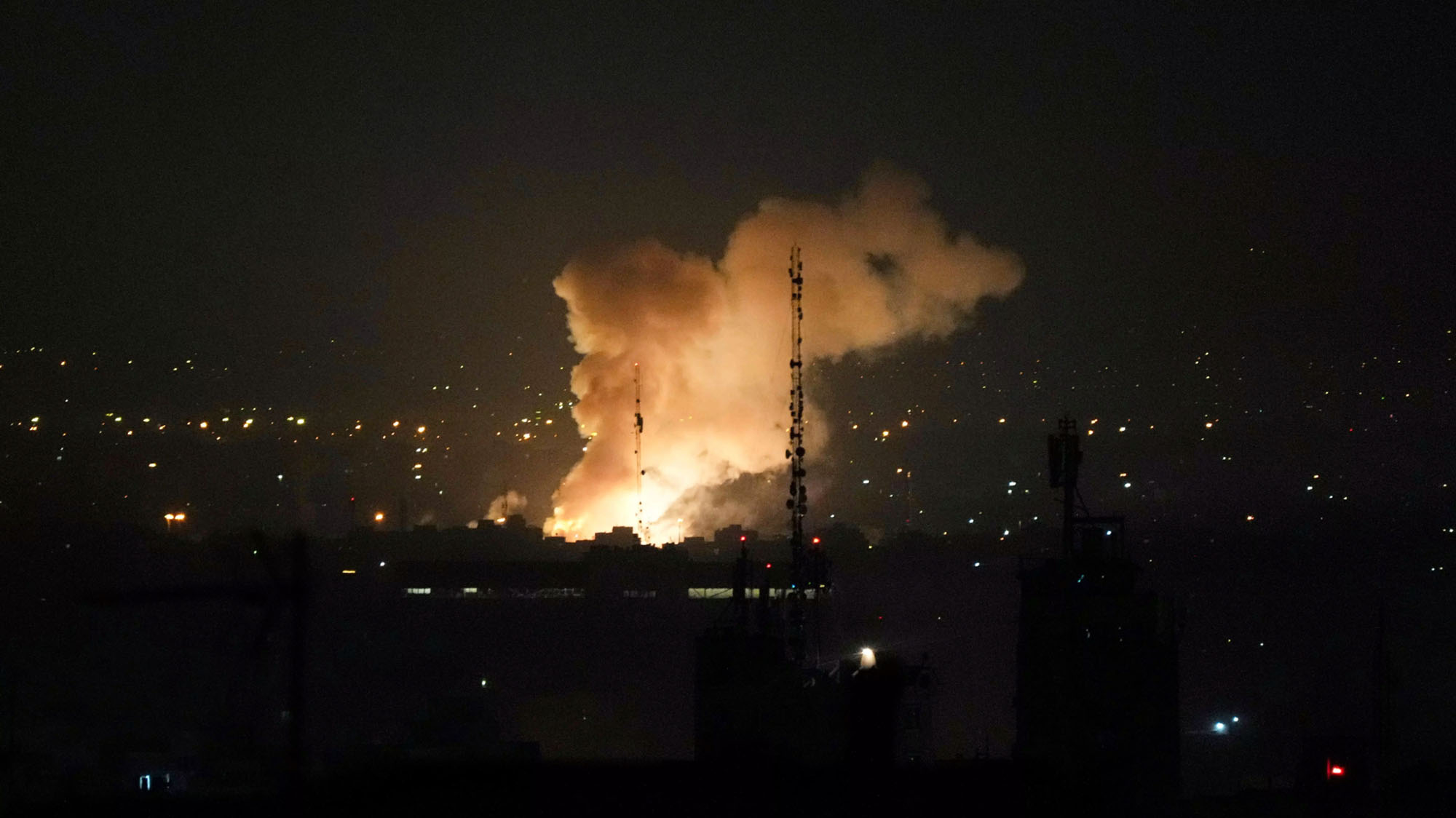The D Brief: Israel bombs Iran; Courts debate Guard deployment; Navy merges drone efforts; SecDef pressed on firings; And a bit more.
More than 200 Israeli jets conducted a series of deadly airstrikes overnight against numerous targets inside Iran, including the country’s top military and paramilitary leaders as well as uranium enrichment sites in Natanz, “which has operated for years to achieve nuclear weapons capability and houses the infrastructure required for enriching uranium to military-grade levels,” the Israeli military announced on social media Friday. Iranian air defenses were sabotaged by Mossad agents who had smuggled drones and other explosives into Iran, then used them to take out missile systems and other sites as the strikes began, Israel officials told Nextgov’s David DiMolfetta in Jerusalem. A bit more on that, here. Notable: Iran’s underground uranium enrichment center at Fordow and its Isfahan nuclear fuel site seem to have been unaffected so far, Rafael Grossi of the International Atomic Energy Agency said Friday. Reuters reports at least 20 senior commanders were killed in the strikes, which Israel describes as pre-emptive. The New York Times has a bit more on some top officials believed to have perished in the attacks. Two U.S. Navy ships are racing to the region with additional missile-defense capability, Politico reports. Why now? “Recent intelligence shows Iran is nearing the point of no return in its race toward a nuclear weapon,” the Israeli military says—U.S. intelligence agencies reportedly disagreed—and Israel insists Iran “is producing thousands of kilograms of enriched uranium, alongside decentralized and fortified enrichment compounds, in underground, fortified sites. This program has accelerated significantly in recent months, bringing the regime significantly closer to obtaining a nuclear weapon.” Rewind: Reports an Israeli attack was imminent surfaced just days ago, prompting U.S. officials to authorize its military families to depart the region, as we highlighted in Thursday’s newsletter. Stars and Stripes has a bit more. AP headline: “Israel’s attack on Iran was years in the making.” More after the jump... Welcome to this Friday edition of The D Brief, a newsletter dedicated to developments affecting the future of U.S. national security, brought to you by Ben Watson and Bradley Peniston and Lauren C. Williams. Share your tips and feedback here. And if you’re not already subscribed, you can do that here. On this day in 1997, a jury sentenced Timothy McVeigh to death for his part in the 1995 Oklahoma City bombing. Israel calls its Friday morning strikes “the first stage” of its latest overt efforts to stop Iran from obtaining a nuclear weapon. “Weapons of mass destruction in the hands of the Iranian regime are an existential threat to the State of Israel and to the wider world. The State of Israel has no choice but to fulfill the obligation to act in defense of its citizens and will continue to do so everywhere it is required to do so, as we have done in the past,” the Israeli Defense Forces said in a statement. One forecast: Israel has prepared two weeks of operations against Iran, the Wall Street Journal reports. White House reaction: “Two months ago I gave Iran a 60 day ultimatum to ‘make a deal,’” President Trump said on social media Friday. “They should have done it! Today is day 61. I told them what to do, but they just couldn’t get there. Now they have, perhaps, a second chance!” Expert reax: “The breadth and scale of these strikes—against senior Iranian officials and other military facilities in addition to nuclear sites—suggest this operation is intended to not just dissuade Iran from pursuing nuclear weapons, but also cripple any potential military response and even to destabilise the regime,” said Matthew Savill of the London-based Royal United Services Institute. “Details are still emerging but the reported targeting of the commander of the IRGC, the head of the conventional military, and advisers to Iran’s Supreme Leader, are all beyond that necessary for a purely ‘pre-emptive’ strike on the nuclear programme.” On the durability of this campaign: “The size of the force allegedly assembled for this series of attacks represents the overwhelming bulk of their longer-range strike aircraft,” Savill said, and added, “They have the ability to conduct multiple such rounds of strikes, but operating for an extended duration over this considerable range will stretch even the Israeli Air Force.” Capitol Hill reax: “Iran’s sprint to become a nuclear threat to America and our allies, while leading the world in proliferating terrorism, is the cause of this conflict,” said Mississippi GOP Sen. Roger Wicker, chairman of the Armed Services Committee. “The single worst decision Iran could make now is to target American service members. I’m confident [Central Command] General Kurilla and [Defense] Secretary Hegseth have prepared our forces in the region for the threat environment they face,” Wicker said. Wicker’s Democratic colleague Jack Reed of Rhode Island called Israel’s attack “a reck

Iranian air defenses were sabotaged by Mossad agents who had smuggled drones and other explosives into Iran, then used them to take out missile systems and other sites as the strikes began, Israel officials told Nextgov’s David DiMolfetta in Jerusalem. A bit more on that, here.
Notable: Iran’s underground uranium enrichment center at Fordow and its Isfahan nuclear fuel site seem to have been unaffected so far, Rafael Grossi of the International Atomic Energy Agency said Friday. Reuters reports at least 20 senior commanders were killed in the strikes, which Israel describes as pre-emptive. The New York Times has a bit more on some top officials believed to have perished in the attacks.
Two U.S. Navy ships are racing to the region with additional missile-defense capability, Politico reports.
Why now? “Recent intelligence shows Iran is nearing the point of no return in its race toward a nuclear weapon,” the Israeli military says—U.S. intelligence agencies reportedly disagreed—and Israel insists Iran “is producing thousands of kilograms of enriched uranium, alongside decentralized and fortified enrichment compounds, in underground, fortified sites. This program has accelerated significantly in recent months, bringing the regime significantly closer to obtaining a nuclear weapon.”
Rewind: Reports an Israeli attack was imminent surfaced just days ago, prompting U.S. officials to authorize its military families to depart the region, as we highlighted in Thursday’s newsletter. Stars and Stripes has a bit more.
AP headline: “Israel’s attack on Iran was years in the making.”
More after the jump...
Welcome to this Friday edition of The D Brief, a newsletter dedicated to developments affecting the future of U.S. national security, brought to you by Ben Watson and Bradley Peniston and Lauren C. Williams. Share your tips and feedback here. And if you’re not already subscribed, you can do that here. On this day in 1997, a jury sentenced Timothy McVeigh to death for his part in the 1995 Oklahoma City bombing.
Israel calls its Friday morning strikes “the first stage” of its latest overt efforts to stop Iran from obtaining a nuclear weapon. “Weapons of mass destruction in the hands of the Iranian regime are an existential threat to the State of Israel and to the wider world. The State of Israel has no choice but to fulfill the obligation to act in defense of its citizens and will continue to do so everywhere it is required to do so, as we have done in the past,” the Israeli Defense Forces said in a statement.
One forecast: Israel has prepared two weeks of operations against Iran, the Wall Street Journal reports.
White House reaction: “Two months ago I gave Iran a 60 day ultimatum to ‘make a deal,’” President Trump said on social media Friday. “They should have done it! Today is day 61. I told them what to do, but they just couldn’t get there. Now they have, perhaps, a second chance!”
Expert reax: “The breadth and scale of these strikes—against senior Iranian officials and other military facilities in addition to nuclear sites—suggest this operation is intended to not just dissuade Iran from pursuing nuclear weapons, but also cripple any potential military response and even to destabilise the regime,” said Matthew Savill of the London-based Royal United Services Institute. “Details are still emerging but the reported targeting of the commander of the IRGC, the head of the conventional military, and advisers to Iran’s Supreme Leader, are all beyond that necessary for a purely ‘pre-emptive’ strike on the nuclear programme.”
On the durability of this campaign: “The size of the force allegedly assembled for this series of attacks represents the overwhelming bulk of their longer-range strike aircraft,” Savill said, and added, “They have the ability to conduct multiple such rounds of strikes, but operating for an extended duration over this considerable range will stretch even the Israeli Air Force.”
Capitol Hill reax: “Iran’s sprint to become a nuclear threat to America and our allies, while leading the world in proliferating terrorism, is the cause of this conflict,” said Mississippi GOP Sen. Roger Wicker, chairman of the Armed Services Committee. “The single worst decision Iran could make now is to target American service members. I’m confident [Central Command] General Kurilla and [Defense] Secretary Hegseth have prepared our forces in the region for the threat environment they face,” Wicker said.
Wicker’s Democratic colleague Jack Reed of Rhode Island called Israel’s attack “a reckless escalation that risks igniting regional violence…While tensions between Israel and Iran are real and complex, military aggression of this scale is never the answer.”
“I urge both nations to show immediate restraint, and I call on President Trump and our international partners to press for diplomatic de-escalation before this crisis spirals further out of control,” Reed said.
Israeli Prime Minister Benjamin “Netanyahu wasn’t trying to help diplomacy; he was trying to destroy diplomacy,” said Connecticut Democratic Sen. Chris Murphy of the Foreign Relations Committee. “How do we know? They reportedly targeted and killed Iran’s chief negotiator with Trump,” he wrote on social media Friday.
“Game on. Pray for Israel,” wrote GOP Sen. Lindsey Graham, also of the Foreign Relations Committee.
Additional reading:
- “Israel’s attack raises potential for all-out war,” the Associated Press reports;
- “Israel's strike on Iran was 8 months in the making,” Axios reports;
- “Striking the Heart of the Iranian Regime, Netanyahu Looks to His Legacy,” the New York Times reports;
- “MAGA Warned Trump on Iran. Now He’s In An Impossible Position,” Rachel Bade of Politico writes;
- And don’t miss a brand-new think-tank report, “Nuclear Cooperation Among the ‘Axis of Aggressors’: An Emerging Threat,” which reviews the challenges presented by the combined efforts of Russia, China, Iran and North Korea, via the Foundation for Defense of Democracies in Washington.
Troops in California
Thursday’s judicial whiplash: Hours after one judge ruled that the Trump administration had illegally federalized National Guard troops for deployment to Los Angeles, a higher court put the stay on hold. CNN: “Senior US District Judge Charles Breyer had ruled that Trump unlawfully federalized thousands of members of California’s National Guard and must return control of the troops to the state by mid-day Friday. But the order from the 9th US Circuit Court of Appeals puts that on pause.” More, here.
Around the Defense Department
How drone warfare fares in the 2026 budget proposal. The Pentagon wants to spend more than 20 percent more next year to research, develop, test and evaluate new technologies—but that increase would come from the Trump administration’s massive tax and budget reconciliation bill, leaving funding levels flat if Congress doesn’t pass it. And a lot of drone spending will likely hinge on that one-time funding, Defense One’s Lauren C. Williams reported Thursday.
Navy combines large drone-boat efforts. Its large and medium unmanned surface vehicle programs will become a “single program for autonomous surface craft,” the Government Accountability Office wrote in its annual report auditing the Pentagon’s major weapons. The streamlined program, which Navy officials hinted at earlier this year, is expected to start development by 2027 under “the major capability acquisition pathway,” officials told GAO.
The Navy will also take over DARPA’s USX-1 Defiant, Adm. James Kilby, the acting chief of naval operations, told lawmakers in written testimony this week. DARPA finished building the 180-foot ship in February and is now performing commissioning trials. “Defiant will be the Navy’s first Medium Unmanned Surface Vessel (MUSV) that is designed from the ground up as an unmanned ship and will operate in a fully unmanned fashion,” Kilby wrote.
Hegseth grilled on CNO, other firings. It’s been nearly four months since Defense Secretary Pete Hegseth fired the chief of naval operations and several other military officials, and only one position—the chairman of the Joint Chiefs—has been replaced with a Senate-confirmed officer. Thursday, several lawmakers asked Hegseth why it’s taking so long, and why they were fired in the first place. “In due time and for all the right reasons,” Hegseth said when asked specifically about the CNO role during a House Armed Services Committee hearing.
It was the first time in a public setting that the defense secretary has taken questions on the decisions to not only fire the Joint Chiefs chairman, the CNO, the vice chief of staff of the Air Force, and the top lawyers of all three military departments, but also the dual-hatted head of U.S. Cyber Command and the National Security Agency in April.
Rep. Don Bacon, R-Neb., on Gen. Timothy Haugh, the former CYBERCOM commander and NSA chief: “Having Gen. Haugh fired—we groomed him for over a decade to fill those shoes, and I don't know that anybody can fill those shoes right now. It's going to take a year or two for people to get there,” Bacon said. “I really believe that the most happy people on the firing of Gen. Haugh [were] Russia and China.”
No one has been nominated to take his place. But when asked when an announcement was coming, Hegseth told Rep. Sarah Elfreth, D-Md., “It will not be that long.” Defense One’s Meghann Myers has a bit more, here.
Additional reading: “National Guard activates first-of-its-kind electromagnetic warfare company,” Task & Purpose reported Tuesday. ]]>


















































































































































